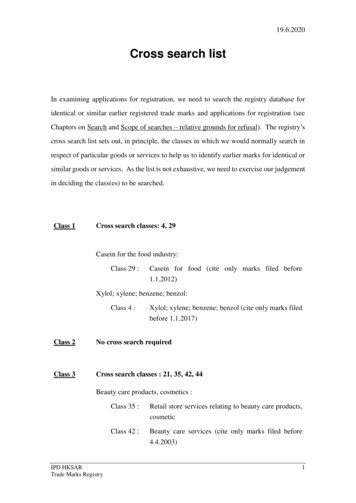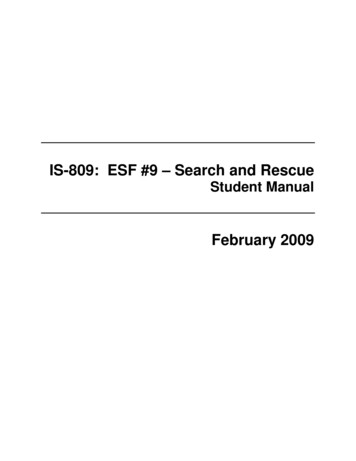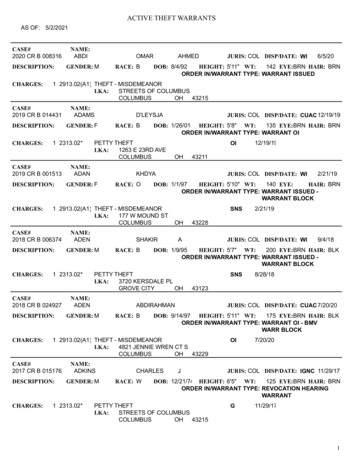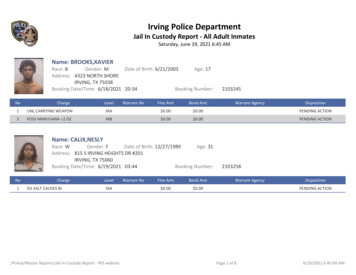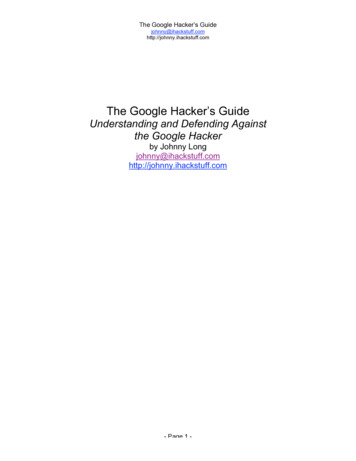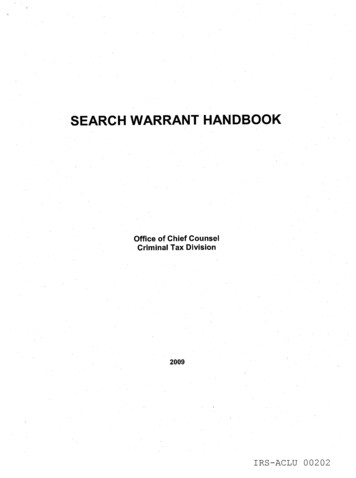
Transcription
SEARCH WARRANT HANDBOOKOffice of Chief CounselCriminal Tax Division2009IRS-ACLU 00202
PREFACECriminal Tax attorneys frequently provide legal advice to Criminal Investigationpersonnel with respect to search warrant applications. To assist in evaluating suchapplications, this handbook provides an overview of search warrant law, The overviewprovided herein is not intended to take the place of thorough legal research with respectto a particular search warrant application.This handbook does not create or confer any rights, privileges, or benefits on any.person, It is not intended to have the force of faw or of a statement of Internal RevenueService policy, See United States v. Caceres, 440 U.S. 741 (1979),s/Edward F. CroninEDWARD F. CRONINDivision Counsel/Associate Chief Counsel(Criminal Tax)Internal Revenue ServiceIRS-ACLU 00203
TABLE OF CONTENTSINTRODUCTION .; .1A, Primary Authorities . 2B.1,2Fourth Amendment .2,, . 3Federal Rules of Criminal Procedure, Rule 41 .Primary Legal Issues . .41.Reasonable Expectation of Privacy .42.Probable Cause .i . " . 43.Particularity . 55REASONABLE EXPECTATION OF PRIVACY .A.Subjective Expectation of Privacy .5B.Reasonableness . . 6PROBABLE CAUSE . i . 9A.Standards of Review . . : . 9B.Factual Showing . . 10C.Agent’s Conclusions .i . , . 10D.Informants . 12E.1.Totality-of-the-Circumstances Analysis . .122.Factors Considered ." . 133.Criminal Activity of informants .144 Anonymous and Confidential Informants .155.Corroboration . 15Staleness . 171.Factors . , . 182.Ongoing Pattern of Criminal Activity .i.18IRS-ACLU 00204
3.Business Records . 19F. Anticipatory Search Warrants . : . : . 19G.IV. .Effect of False Statements or Omissions .1.Material False Statements .202.Material Omissions .: . " . 21PARTICULARITY .i . i . 22A.Generality vs. Overbreadth .,. . 22B.Standards of Review .:.i . 24C.Place to be Searched . 25D.Items to Be Seized . . .261.Factors Considered . 282.Best Practices . 28a. . 29Inclusion of All Available Information .b.Reference to Criminal Violations .30c.Reference to Time Frame . . 32d.Incorporation and Attachment of Affidavit .32e.Examples . . 333. Generic Descriptions ." . . 344.Catch-All Phrases . . 355.a."Including but Not Limited to". .35’b.Other Catch-All Phrases . . .36"Permeated With Fraud". .3841EXECUTING THE WARRANT: THE PLAIN VIEW DOCTRINE .A.General Requirements .42Immediate Apparency . . . 43IRS-ACLU 00205
45REMEDIES FOR UNLAWFUL SEARCHES AND SEIZURES .A,B.The Exclusionary Rule .451.Total vs. Partial Suppression .462,Good Faith Exception . : . 47.3.Attenuation Exception .504.Independent Source Exception .515.Inevitable Discovery Exception .,. 52" . 54Agent. Liability and Qualified Immunity .C. Government Liability . . . 55VII.55COMPUTER RELATED SEARCHES AND SEIZURES .A.Reasonable Expectation of Privacy .56B.Probable Cause . 56C.Particularity . . i . . 57D.Ninth Circuit Procedural Requirements ." .59E.59Privacy Statutes that May Apply to Computer Searches .1.The Stored Communications Act .592.The Privacy Protection Act .60ivIRS-ACLU 00206
search; threw her to the ground, and handcuffed her so tightly as to cause pain.Assuming these allegations to be true, the court concluded that the agent’s conductviolated the Fourth Amendment, that a reasonable agent in his position would haveknown that it did, and that therefore the agent was not entitled to qualified immunityonthose charges. 342 F.3d at 1059. However, with respect to the plaintiff’s claim thatdetaining her in handcuffs dudng the search was unlawful, the court held that eventhough the agent had violated her constitutional rights, he was entitled to qualifiedimmunity as to this portion of her claim. The court explained that, at the time of thesearch, the case law had not clearly established that this conduct violated the plair tiff’sconstitutional rights. Id. at 1065.Qualified immunity was held not to apply with respect to any of the claimsbrought against IRS agents in Tekle v. United States, 511 F.3d 839 (gth Cir. 2007). tnthat case, the agents executed search and arrest warrants at the home of the plaintiff’sparents, who were suspected of narcotics trafficking and tax-related offenses. Dudngthe search, the agents allegedly held a gun to the head of the eleven-year-old plaintiff,who was unarmed and barefoot, handcuffed him, pulled him up by the chain of thehandcuffs, and detained him with the handcuffs on for approximately 15 minutes andthen for an additional 10-15 minutes with guns still drawn. The plaintiff brought a Bivensaction against the agents for the use of excessive force and for subjecting him to anunreasonable detention. The Ninth Circuit held that agents were not entitled to assertqualified immunity because "a reasonable officer should have known that it wasconstitutionally excessive to use such force and to use the handcuffs in the manneralleged against an unarmed elevemyear-old child who was fully complying with theofficer’s requests." 511 F.3d at 856.C. Government LiabilityIn addition to claims against individual officials, the Federal Tort Claims Act("F.T.C.A.") provides that a civil action alleging an illegal arrest, search, or seizure by afederal officer may be brought directly against the United States government. 28 U.S.C.§ 2680(h). The relevant portion of§ 2680(h) provides that the federal government is notimmune to suit with regard to "acts or omissions of investigative or law enforcementofficers of the United States Government ’ for "any claim arising . out of assault,battery, false imprisonment, false arrest, abuse of process, or malicious prosecution."ld. The provision defines "investigative or law enforcement officer" as "any officer of theUnited States who is empowered by law to execute searches, to seize evidence, or tomake arrests for violations of Federal law." id.V!!,COMPUTER-RELATED SEARCHES AND SEIZURESComputer*related searches and seizures are subject to the same FourthAmendment requirements that apply to any search or seizure: a warrant is generallyrequired if the target has a reasonable expectation of pdvacy in the computer to besearched, and the warrant application must be evaluated.for probable cause andparticularity. However, the legal analysis of these issues must take into account theunique characteristics of computers, which enable users to-store vast amounts of55IRS-ACLU 00207
information and to share or restrict access to that information in various ways. Further,when searching computers, law enforcement agencies are subject to specificrestrictions and obligations under the Stored Communications Act ("SCA"), 18 U.S.C. §2701, et seq, and the Privacy Protection Act ("PPA"), 42 U .S,C, § 2000aa et seq.A. Reasonable Expectation of PrivacyThe analysis of an individual’s expectation of privacy with respect to a computerdepends on the !ocation and ownership of the computer and the extent to which it maybe accessed by others. Courts have held that an individual generally has a reasonableexpectation of privacy with respect to his or her home computer. See United States v.Lifshitz, 369 F.3d 173, 190 (2d Cir. 2004); Guest v. Leis, 255 F.3d 325, 333 (6th Cir,2001). Conversely, an employee may have a reduced expectation of pdvacy in his orher office computer, especially if that computer is subject to some level of monitoring byhis or her employer. See United States v. Simons, 206 F.3d 392, 398 (4th Cir, 2000).When two or more individuals share a computer, or when an individual’scomputer has f le-sharing software or is attached to a network, courts must engage in afact-intensive analysis to determine whether Fourth Amendment protections apply. In .such situations, if access to files is limited by a password or other means, there may bea reasonable expectation of privacy, See Trulock v, Freeh, 275 F.3d 391,403(4th Cir.2001 ); United States v. Heckenkamp, 482 F,3d 1142, 1146 (9th Cir. 2007) Like flies shared over a network, emails and other transmissions generally losetheir reasonable expectation privacy and thus their Fourth Amendment protectiononce they have been sent from an individual’s computer. See United States v. Lifshitz,369 F.3d at t90; Guest v.Leis, 255 F.3d at333. A similar principle applies to acomputer user’s subscriber information, which is shared with an internet serviceprovider and is therefore not subject to Fourth Amendment protections. See United .States v. Perrine, 518 F.3d 1196, 1204 (10th Cir 2008),B. Probable CauseAs with all searches, if there is a reasonable expectation of pdvacy and thewarrant requirement applies, applications for computer-retated warrants must beevaluated for probable cause, in general, the probable cause analysis for computerrelated searches is no different from the analysis for other searches. See United Statesv. Giberson, 527 F.3d 882, 888 89 (9th Cir. 2008) (stating, with respect to a computersearch for tax records and other documents, that "the potential intermingling ofmaterials [on a computer] does not justify an exception or heightened proceduralprotections for computers beyond the Fourth Amendment’s reasonablenessrequirement,"). But see United States v. Comprehensive Drug Testing, Inc,, 579 F,3d989 (9th Cir. 2009) (an banc) (imposing new procedural requirements with respect tothe search and seizure of electronic data from a non-suspect third party). As with othertypes of searches, the connection between the place to be searched and the items tobe seized may be inferred if that inference has "common sense appeal." United Statesv, Perry, 531 F.3d 662,665 (Sth Cir. 2008),6IRS-ACLU 00208
For example, in United States v. Khanani, a case involving immigrationviolations, money laundering conspiracy, and the evasion of federal employment andincome taxes, the defendant contended that the seizure of his computers was withoutprobable cause because the affidavit submitted with the warrant application provided nofact-specific reason to believe there were computers in his office, or that his computershad been used to facilitate the commission of any of the alleged criminal violations,502 F.3d 1281, !290 (11th Cir. 2007). The court disagreed, noting that the affidavitdescribed the defendant as an accountant for one of the co-conspirators and that oneof the tax returns for that individual had been found in the trash outside the defendant’soffice:While the Master Affidavit did not indicate that it was a computergenerated tax form, in reviewing the affidavit to ascertain whether itfurnished probable cause for the warrant sought, the affidavit is given a"common sense and realistic" interpretation, o. Additionally, [a witnessfor the government] testified, that prior to the warrant application, he hadentered [the defendant’s] office and observed connected computers. Thedistrict court did not err in concluding that the allegations of the MasterAffidavit were sufficient to provide probable cause for the seizure ofcomputers from [the defendant’s] accounting business.Id. (citations omitted). As this quotation indicates, the same "common sense" standardthat applies to probable cause determinations .in general also applies in the context ofcomputer-related searches and seizures. See Illinois v. Gates, 462 U.S. 213,238(1983) (".The task of the issuing magistrate is simply to make a practical, commonsense decision whether, given all the circumstances set forth in the affidavit before him,. there is a fair probability that contraband or evidence of a cdme wilt be found in aparticular place.").C. ParticularityComputer technology poses unique challenges with respect to the particularityrequirement, Because computers are capable of stodng and intermingling a great dealof information, and because computer data may be mislabeled or otherwise concealed,it may be difficult to draft a computer search warrant that is comprehensive withoutbeing overbroad. This potential for overbreadth, however, underscores the importanceof drafting computer search warrants with sufficient particularity, See United States v.Otero, 563 F.3d 1127, 1132 (10th Cir. 2009) ("The modern development of the personalc6mputer and its ability to store and intermingle a huge array of one’s personal papersin a single place increases taw enforcement’s ability to conduct a wide-ranging searchinto a person’s private affairs, and accordingly makes the particularity requirement thatmuch more important.").In Otero, a case involving charges of mail fraud and credit card theft against apostal carrier, the Tenth Circuit emphasized that "warrants for computer searches mustaffirmatively limit the search to evidence of specific federal cdmes or specific types of57IRS-ACLU 00209
material." 563 F.3d at 1132 (citation omitted; emphasis in original). The court held thatthe warrant at issue lacked.sufficient particularity on the following grounds:Attachment B is quite neatly divided into two subsections: "ITEMS TO BESEIZED" and "COMPUTER ITEMS TO BE SEIZED." Each paragraphunder the first section takes pains to limit the search to evidence ofspecific crimes or evidence pertaining to specific persons along Ms,Otero’s delivery route. Each paragraph under the second section, incontrast, has no limiting instruction whatsoever, Read alone, they eachauthorize a search and seizure of "[a]ny and all" information, data,devices, programs, and other materials. There is no explidt or evenimplidt incorporation of the limitations of the first five paragraphs. Thecomputer-related paragraphs do not even refer to the rest of the warrant.In fact, the presence, of limitations in each of the first five paragraphs butabsence in the second four suggests that the computer searches are notsubject to those limitations. Even when read in the context of the overallwarrant, therefore, the paragraphs authorizing the computer search weresubject to no affirmative limitations,Id. at 1 I32 33. The Otero holding indicates that explicit references to "affirmativelimitations," such as a description of the specific cdmes suspected, must be made in thecomputer section of a,.search warrant in order to satisfy the particularity requirement,See also United States v. Adjani, 452 F.3d 1 t40, 1149 (9th Cir, 2006) (holding that thewarrant at issue satisfied the particularity requirement in part because "the governmenthere did describe at some length both the nature of and the means of committing thecrime.").Although courts have emphasized the need for particularity in computer searchwarrants, they also recognize that the government may be unable to search for specificcomputer files during the execution of a warrant and may need to conduct a wholesaleseizure of the computers themselves for subsequent searching. See, e.g., Guest v.Leis, 255 F.3d 325, 335 (6th Cir, 2001 ) ("Because of the technical difficulties ofconducting a computer search in a suspect’s home, the seizure of the computers, .including their content, was reasonable in these cases to allow police to locate theoffending files."); Upham, 168 F.3d at 535 ("it is no easy task to search a well-ladenhard drive by going through all of the information it contains ., The record shows thatthe mechanics of the search for images later performed off site could not readily havebeen done on the spot."). It cannot be assumed, however, that the seizure of acomputer for off-site searching is justified in every instance. Rather, to satisfy theparticularity requirement, a search warrant affidavit must provide facts that support theneed for an off-site search. See United States v. Hill, 459 F.3d 966, 975-76 (9th Cir,2006) (’ Ve do not approve of issuing warrants authorizing blanket removal of allcomputer storage media for later examination when there is no affidavit giving areasonable explanation ,,, as to why a wholesale seizure is necessary.").58IRS-ACLU 00210
Consideration should also be given to the possibility of imaging a computer’shard drive rather than seizing the computer itself, because removal of the computer maymake it impossible for the target to continue conducting business. See, e.g, UnitedStates v. Raybum House Office Building, Room 2113, Washington, D.C. 20515, 497F.3d 654, 670 (D.C. Cir. 2007) (noting that one of the ways in which FBI agents whosearched a congressman’s office minimized disruption was by "imaging computer harddrives rather than searching the computers").D. Ninth Circuit Procedural Requirementstn a recent en banc opinion involv!ng the search of a non-suspect third party’scomputers, the Ninth Circuit introduced new procedural requirements for computerrelated searches. See United States v. Comprehensive Drug Testing, lnc., 579 F.3d989 (9th Cir. 2009). The court described these new guidelines as follows:1. Magistrates should insist that .the government waive reliance upon theplain view doctrine in digital evidence cases .2. Segregation and redaction must be either done by specializedpersonnel or an independent third party .3. Warrants and subpoenas must disclose the actual risks of destructionof information as well as prior efforts to seize that information in otherjudicial fora .4. The government’s search protocol must be designed to uncover.onlythe information for which it has probable cause, and only that informationmay. be examined by the case agents .5. The government must destroy or, if the recipient may lawfully possessit, return non-responsive data, keeping the issuing magistrate informedabout when it has done so and what it has kept.579 F.3d at 1006.E.Privacy Statutes that May Apply to Computer Searches1.The Stored Communications ActIn general, the Fourth Amendment does not protect communications held melectronic storage, such as email messages stored on a server,, because internet usersdo not have a reasonable expectation of pdvacy in such communications, Further,because the Fourth Amendment applies to government searches rather than searchesby pdvate actors, it does not appear to limit the ability of internet service providers("ISPs") to obtain customer information and disclose it to the government; To fill this59IRS-ACLU 00211
gap, the Stored Communications Act ("SCA"), t8 U.S.C. §§ 270I-11,19 establishescertain protections for customer information inthe possession of ISPs. See 18 U.S.C.§ 2703, Specifically, if the government seeks to compel disclosure of the contents ofelectronic communications and other information without prior notice to customers orsubscribers, the SCA requires thata valid search warrant be obtained. See Guest v.Leis, 255 F.3d 325, 339 (6th Cir. 2001).2.The Privacy Protection ActThe Fourth Amendment also does not apply to searches and seizures ofdocumentary evidence in the possession of innocent third parties, such as the press.See Zurcher v. Stanford Dai@’, 436 U,S. 547 (1978), However, the Privacy ProtectionAct of 1980.("PPA"), 42 U.S.C. § 2000aa et seq., makes it unlawful for a governmentemployee to search for or seize documentary materials possessed by a person with apurpose to disseminate some form of public communication. 42 U.S.C. §§ 2000aa(a);(b). The PPA generally does not apply if the materials sought constitute contraband orthe means of committing a criminal offense, or if there is probable cause to believe theperson possessing the materials has committed a criminal offense to which thematerials relate, 42 U.S.C. § 2000aa(a).As the Sixth Circuit has observed, interpretation of the PPA presents particularchallenges in the context of computer searches. See Guest v. Leis, 255 F.3d 325, 34t(6th Cir. 200t), These challenges stem from the difficulty of i’separat[ing] the offendingmaterials from other ’innocent’ material on the computer." Id. at 341-42. In Guest, thecourt expressed concern .that criminals might seek to insulate electronically-heldcriminal evidence from search and seizure by including PPA-protected materials ontheir computers. See id. at 342. Accordingly, the court held that "when protectedmaterials are commingled on a criminal suspect’s computer with cdminal evidence thatis unprotected by the act, we will not find liability under the PPA for seizure of the PPAprotected materials." Id. The court cautioned, however, that "police may not then search the PPA-protected materials that were seized incidentally to the criminalevidence." Id. In the case before it, the court declined to find the defendants liableunder the PPA because the owner or operator of the.computers at issue was a criminalsuspect, and the PPA-protected materials were not searched. Id. The SCA is Title II of the Electronic Communications Pdvacy Act ("ECPA"), Pub. L.99-508, 100 Star. 1848.6OIRS-ACLU 00212
it may be difficult to draft a computer search warrant that is comprehensive without being overbroad. This potential for overbreadth, however, underscores the importance of drafting computer search warrants with sufficient particularity, See United States v. Otero, 563 F.3d 1127, 1132
